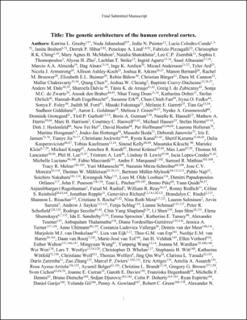The genetic architecture of the human cerebral cortex
Grasby, Katrina L.; Jahanshad, Neda; Painter, Jodie N; Colodro-Conde, Lucía; Bralten, Janita; Agartz, Ingrid; Alnæs, Dag; Gurholt, Tiril Pedersen; Kaufmann, Tobias; Sønderby, Ida Elken; van der Meer, Dennis; Westlye, Lars Tjelta; Wolfers, Thomas; Djurovic, Srdjan; Le Hellard, Stephanie; Andreassen, Ole Andreas; Jönsson, Erik Gunnar; Steen, Vidar Martin; Medland, Sarah E.
Peer reviewed, Journal article
Accepted version
Permanent lenke
https://hdl.handle.net/11250/3033616Utgivelsesdato
2020Metadata
Vis full innførselSamlinger
Sammendrag
The cerebral cortex underlies our complex cognitive capabilities, yet little is known about the specific genetic loci that influence human cortical structure. To identify genetic variants that affect cortical structure, we conducted a genome-wide association meta-analysis of brain magnetic resonance imaging data from 51,665 individuals. We analyzed the surface area and average thickness of the whole cortex and 34 regions with known functional specializations. We identified 199 significant loci and found significant enrichment for loci influencing total surface area within regulatory elements that are active during prenatal cortical development, supporting the radial unit hypothesis. Loci that affect regional surface area cluster near genes in Wnt signaling pathways, which influence progenitor expansion and areal identity. Variation in cortical structure is genetically correlated with cognitive function, Parkinson’s disease, insomnia, depression, neuroticism, and attention deficit hyperactivity disorder.
